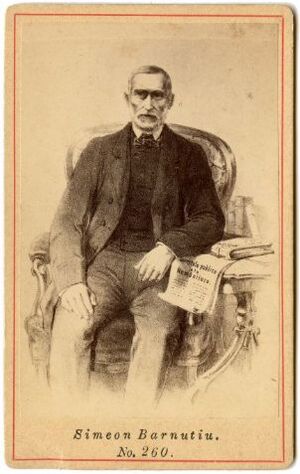Simion Bărnuțiu facts for kids
Quick facts for kids
Simion Bărnuțiu
|
|
|---|---|
 |
|
| Born | 21 July 1808 |
| Died | 28 May 1864 (aged 55) Fântâna Gorgana, Sânmihaiu Almașului, Kolozs County, Principality of Transylvania, Austrian Empire
|
| Resting place | Saint Mary Church in Bocșa |
| Nationality | Romanian |
| Education | |
| Alma mater | University of Pavia (6 June 1854) |
| Occupation | Historian, philosopher, jurist |
| Known for | Transylvanian Revolution of 1848 |
| Relatives | Ioan Maniu (Nephew) Iuliu Maniu (Grandnephew) |
Simion Bărnuțiu (born July 21, 1808 – died May 28, 1864) was an important Romanian thinker and politician. He was a historian, philosopher, and lawyer. He played a big role in the 1848 Revolution in Transylvania.
Bărnuțiu was a leader for the Romanian people living in Transylvania. He spent a lot of his life in Moldavia. There, he taught philosophy at important universities.
Contents
Simion Bărnuțiu's Life
Early Years and Ideas
Simion Bărnuțiu was born in a village called Bocșa. This village is in what is now Sălaj County, Romania. At that time, Transylvania was part of the Austrian Empire.
He became a history teacher in Blaj. Bărnuțiu was interested in the ideas of a philosopher named Immanuel Kant. He believed these ideas could help improve society.
Bărnuțiu wrote for a newspaper called Foaie pentru minte, inimă și literatură. He became well-known after 1842. He strongly disagreed with the decision to make Hungarian a semi-official language in Transylvania. This decision was made by the local government, which was mostly controlled by Hungarians.
In 1843, Bărnuțiu spoke up for changes in the church. He wanted church leaders to be chosen by the people. He believed this would help Romanians have more say in their own lives.
The 1848 Revolution
In 1848, many parts of Europe had revolutions. Bărnuțiu was a key figure in the revolution in Transylvania. On March 24, 1848, he called for Romanians in Transylvania to have the right to decide their own future. This is called self-determination.
He argued that Romanians should not accept Transylvania joining the Kingdom of Hungary. Not until they had fair representation and an end to serfdom. Serfdom was a system where people were tied to the land and had to work for a lord.
Blaj Assemblies
Many people gathered at the Blaj Assembly in April 1848. Bărnuțiu gave powerful speeches there. He urged people to be patient but also to keep fighting for their rights. He wanted to make sure Romanians had a voice in their government.
In May, he was chosen as vice-president of the Permanent Committee. This committee was formed by the Blaj delegates. It later became the National Romanian Committee. This group worked to protect Romanian interests.
Later, Transylvania officially joined the Hungarian Kingdom. Hungary also declared its independence. This led to fighting. Bărnuțiu's committee worked with the Austrian governor. They hoped this would lead to Austria recognizing Transylvania as a self-governing Romanian region.
Life in Moldavia
After the revolution, Simion Bărnuțiu went to live in Iași. This was the capital of Moldavia. He wrote many books about law and philosophy. He supported big changes that inspired other liberal thinkers in Moldavia.
In the 1850s, he spoke out against choosing a foreign prince to rule the Romanian lands. He believed Romanians should choose their own leader.
Bărnuțiu also supported a Romanian language and alphabet based on Latin roots. Some people disagreed with this. They thought the language should be based more on how people actually spoke.
Final Years
Simion Bărnuțiu became very sick. He wanted to return to his home village. Sadly, he died on his way there, in a place called Hida.
 | Chris Smalls |
 | Fred Hampton |
 | Ralph Abernathy |

